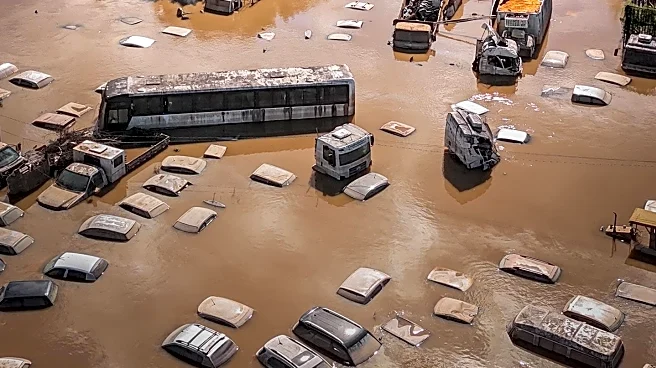What's Happening?
David Hale, an engineering manager from Saltash, Cornwall, has chosen to remain in Jamaica following Hurricane Melissa to assist in recovery efforts. Hale is actively working with local residents to clear
debris, repair homes, and provide essential supplies. He has also initiated an online fundraiser to support these efforts. Despite the area he resides in experiencing less damage than anticipated, other regions are in dire need of assistance. Hale describes widespread destruction, including downed trees, power lines, and flattened houses. He emphasizes the urgent need for food, water, and shelter, noting that tarpaulins are being used to provide temporary cover for those without roofs.
Why It's Important?
The decision by individuals like David Hale to stay and help in the aftermath of natural disasters highlights the critical role of grassroots efforts in disaster recovery. While government agencies often lead relief operations, the scale of destruction can overwhelm available resources, making community-driven initiatives vital. Hale's actions not only provide immediate relief but also foster resilience and solidarity among affected communities. This situation underscores the importance of international cooperation and support in disaster-stricken areas, as local resources may be insufficient to address widespread damage.
What's Next?
Hale plans to continue his efforts by expanding aid relief within the area, as people from other towns are seeking assistance. The ongoing need for food, water, and shelter suggests that recovery will be a prolonged process. As communication with some affected areas remains challenging, coordination with local authorities and international aid organizations will be crucial to ensure effective distribution of resources. The situation may prompt further fundraising initiatives and volunteer mobilization to sustain recovery efforts.
Beyond the Headlines
The hurricane's impact on Jamaica serves as a reminder of the increasing frequency and intensity of natural disasters, potentially linked to climate change. This event may prompt discussions on improving infrastructure resilience and disaster preparedness in vulnerable regions. Additionally, the ethical dimension of international aid and the responsibility of wealthier nations to support those affected by climate-related disasters could gain attention.










